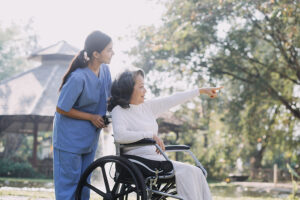It is important to have emergency plans in place, especially when you have caregivers in your home. They need to know the plan so they can execute it. There are several aspects to this that you should keep in mind.

What Kind of Natural Disasters Happen in Our Area?
In Kentucky, most of our extreme weather are tornadoes or snow storms in the winter, rather than hurricanes or earthquakes. This seems incredibly obvious, and it is, but this does shape how you’ll react in an emergency. In Kentucky, that means we get a lot of situations where we have to shelter in place rather than evacuate. However, you should have plans for less common natural disasters as well, just in case. That means researching shelters that can accommodate your needs, like if you have pets or medical equipment.
Write Down Everything
And I mean everything. Write down possible shelters and addresses, multiple emergency contacts, backup plans, and medications (including dosage). Put together an emergency kit and keep important documents together in a water-tight sleeve. Make sure you have backup generators and ways to power your equipment if you lose electricity. Keep the emergency kit in a designated place and write that down, too.
Post the Plan in a Visible Location
Could be the fridge, could be the entry table, it doesn’t really matter as long as first responders or anyone else can locate it quickly. All that planning and writing doesn’t do anyone any good if they can’t find it. This is especially important if anyone in the home has a cognitive impairment.
Emergency preparedness is a good idea for anyone regardless of age. It can give everyone some peace of mind.
Written by Brigid Stakelum



